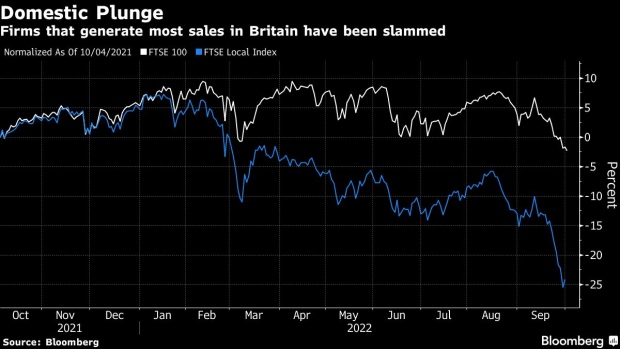Oct 3, 2022
Citi Sees UK Stocks ‘Cult’ Emerging After Gilts Rout
, Bloomberg News

(Bloomberg) -- The recent rout in UK bond markets may bring an end to a “gilt cult” among the country’s pension funds, Citigroup Inc. strategists said.
Funds that have been willing to pay any price to hedge interest-rate and inflation risk received a “much-needed wake-up call” when gilts plunged in reaction to new Prime Minister Liz Truss’s unfunded tax-cut policy, strategists including Robert Buckland wrote in a note Monday.
Such has been the clamor for gilts over the past 20 years that pension-fund weightings are the highest since the 1950s, according to the strategists. Demand has been fueled by the need to meet liabilities spanning decades into the future. Citi sees potential for pension funds to shift back toward UK stocks, which they say offer “decent value” and some protection against future inflation.
“Once the dust settles, maybe a new equity cult will emerge,” they wrote.
Read: UK Pension Strategy That Gilt Market Relied On Becomes Big Risk
The exporter-heavy UK FTSE 100 index has fallen about 4% since Chancellor Kwasi Kwarteng delivered his “mini-budget” on Sept. 23, while an index tracking firms that generate most of their sales in Britain slumped 10% through Friday’s close.
The Citi strategists view that performance as “unsurprisingly resilient” in the face of the selloff in gilts. They reiterated their overweight view, particularly favoring defensive names with large overseas revenues, which they say tend to trade at a discount to global peers. These include drugmaker AstraZeneca Plc, consumer-goods producer Unilever Plc and telecoms provider Vodafone Group Plc.
Their view is in contrast to BlackRock Inc., whose global chief investment strategist Wei Li said on Bloomberg Television that the firm is underweight UK equities and gilts due to concern about fiscal credibility,
The FTSE 100 was up 0.2% as of 3:34 p.m. Monday as UK bonds yields eased following news that Kwarteng’s plan to cut taxes for the highest earners has been scrapped. The announcement is “politically important, but not really fiscally important,” according to Citi’s Buckland.
(Updates Monday’s FTSE move in final paragraph.)
©2022 Bloomberg L.P.





